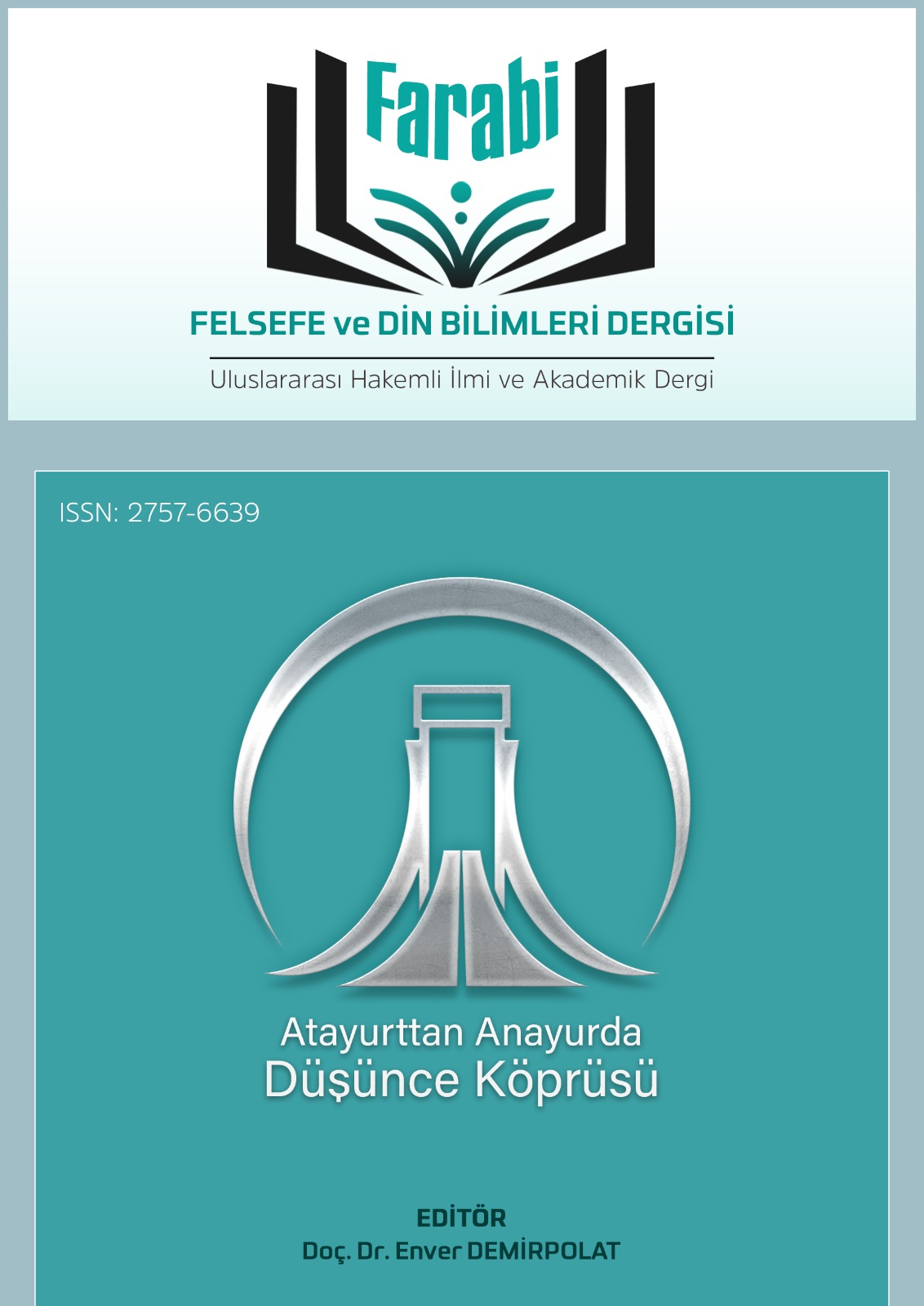Author :
Abstract
Felsefi görüşlerinde insanı temel alan İhvan-ı Safa topluluğunda Ahlâk kavramı çok önemli bir yer teşkil etmektedir. Bu öneminden dolayı hayatın her alanında gerekli olan ahlâkî davranışlar genişçe incelenip değerlendirilmiştir. İyi ahlâkın dünyada ve ahirette insanın mutlu olmasını sağlayacağı, kötü ahlâk ve olumsuz davranışların da insanı mutsuz ve bedbaht kılacağı şeklinde yorumlanmıştır. İhvan-ı Safa, insanı kötü ve ahlâksız bir duruma düşüren, toplum tarafından da hoş karşılanmayan menfi tutumların insanın şahsını etkilediği gibi içinde yaşadığı toplumu ve sosyal çevreyi de etkilediği görüşünü savunur. Bu bağlamda insan, iyi ahlâk sahibi olmalı ve toplum içinde mevcut olan çoğunlukla dinlerin vaaz ettiği genel kurallara uymalıdır.
İhvan-ı Safa’ya göre ahlaki tutum ve davranışların ilim alanında olduğu kadar siyaset alanında da önemli bir konu olarak karşımıza çıkar. Kişinin aldığı eğitime göre şekilleneceğini ifade eden İhvan, aldığı eğitimden dolayı ulaştığı seviye ile kibre kapılmadan ilmin izzetini koruma adına iyi ahlâk sahibi olması gerekmektedir. Yönetme sanatı olarak literatüre geçen siyaset anlayışı, ahlaki ilke ve kurallara muhtaç bir alan olarak incelenmiştir; diğer bir ifadeyle devlet yönetiminde bulunan kimselerin ahlaki ilke ve kurallara harfiyen uyma mecburiyeti söz konusudur. Nitekim İhvân, devlet başkanının ve devlet kademelerinde görev alan devlet adamlarının iyi ve ahlâklı olması devletin ömrünün uzaması ve vatandaşların huzurlu ve mutlu bir şekilde yaşamasının önemli şartlarından olduğuna vurgu yapmıştır.
Keywords
Abstract
The concept of Morality has a very important place in the İhvân’ı Safâ community, which is based on human in its philosophical views. Due to this importance, moral behaviors that are necessary in all areas of life have been extensively studied and evaluated. It has been interpreted that good morals will make people happy in this world and in the hereafter, and bad morals and negative behaviors will make people unhappy and miserable. İhvân’ı Safâ defends the view that negative attitudes, which make people into a bad and immoral situation and are not welcomed by the society, affect the society and social environment in which they live, as well as their personality. In this context, a person should have good morals and obey the general rules preached by mostly religions in society.
According to İhvân’ı Safâ, moral attitudes and behaviors appear as an important issue in the field of politics as well as in the field of science. The Brotherhood, who stated that a person will be shaped according to the education he received, must have good morals in order to protect the dignity of science without being arrogant with the level he has reached due to his education. The understanding of politics, which has entered the literature as the art of management, has been examined as a field in need of moral principles and rules; In other words, people in the state administration are obliged to strictly comply with moral principles and rules. As a matter of fact, the İhvân emphasized that the good and morality of the head of state and the statesmen working in the state levels is one of the important conditions for the prolongation of the life of the state and for the citizens to live peacefully and happily.
Keywords
- Aktaş, Gülistan. İhvan-ı Safa Felsefesinde Ahlâkî Açıdan ‘Mizâç’ Kavramı, Sivas: C. Ü., Sosyal Bilimler Enstitüsü, Enstitüsü Yüksek Lisans Tezi, 2019.
- Aydın, Mehmet, S. "Ahlâk". Türkiye Diyanet İslam Ansiklopedisi, 2/10-14 Ankara: TDV Yayınları, 1989.
- Celal, Vahit. İhvan-ı Safa’da "Mutluluk Düşüncesi". Bartın Üniversitesi İslami İlimler Fakültesi Dergisi 5/9 (2018), 11-17.
- Çağrıcı, Mustafa, İslam Düşüncesinde Ahlak, İstanbul: Dem Yayınları, 7. Basım, 2016.
- Çetinkaya, B. A. İhvân-ı Safa’nın Dini ve İdeolojik Söylemi. Ankara: Elis Yayınları, 1. Basım, 2003
- Farabi. el-Medinetü’l-Fazıla, çev. Ahmet Arslan Ankara: Kültür Bakanlığı Yayınları, 1. Basım, 1990.
- Fârâbî. Tahsîlu’s-Sa’âda. çev. Ahmet Arslan Ankara: Divan Kitap Yayınları, 3. Basım, 2013.
- Filiz, Ş. İhvan-ı Safa Topluluğu ve İnsan Felsefesi-İlk İslam Hümanistleri. Ankara: Bilim ve Ütopya Yayınları, 1. Basım, 2010.
- İhvân-ı Safâ. Risaleler. I-II-III-IV Cilt çev. Ali Durusoy vd. (ed.)Ali Durusoy, Abdullah Kahraman, İstanbul: Ayrıntı Yayınları, 1. Basım, 2012.
- Montesquieu, Kanunların Ruhu Üzerine, çev. Berna Günen, (İş Bankası Kültür Yayınları), İstanbul, 2019.
- Onay, Hamdi, “İhvan-ı Safa’nın Ahlak Anlayışında Farabi’nin Etkisi”, Muallim-i Sani Uzlukoğlu Farabi, Ed: Enver Demirpolat, Rahime Çelik, Kitap Dünyası Yayınları, İstanbul, 2020.
- Onay, Hamdi. İhvan-ı Safa'da Varlık Düşüncesi. İstanbul: İnsan Yayınları, 1. Basım, 1999.
- Refi’i, Behruz. "Berği ez Delalethayi Terbiyeti der Resail’u İhvan-ı Safa", Terbiyeti İslami, yok/11) (2010), 1-25.
- Taş, İsmail. İhvan-ı Safa’da Felsefe ve Din Münasebeti. Konya: Palet Yayınları, 1. Basım, Ülken, Hilmi Ziya, Ahlâk, İstanbul, 1946.





